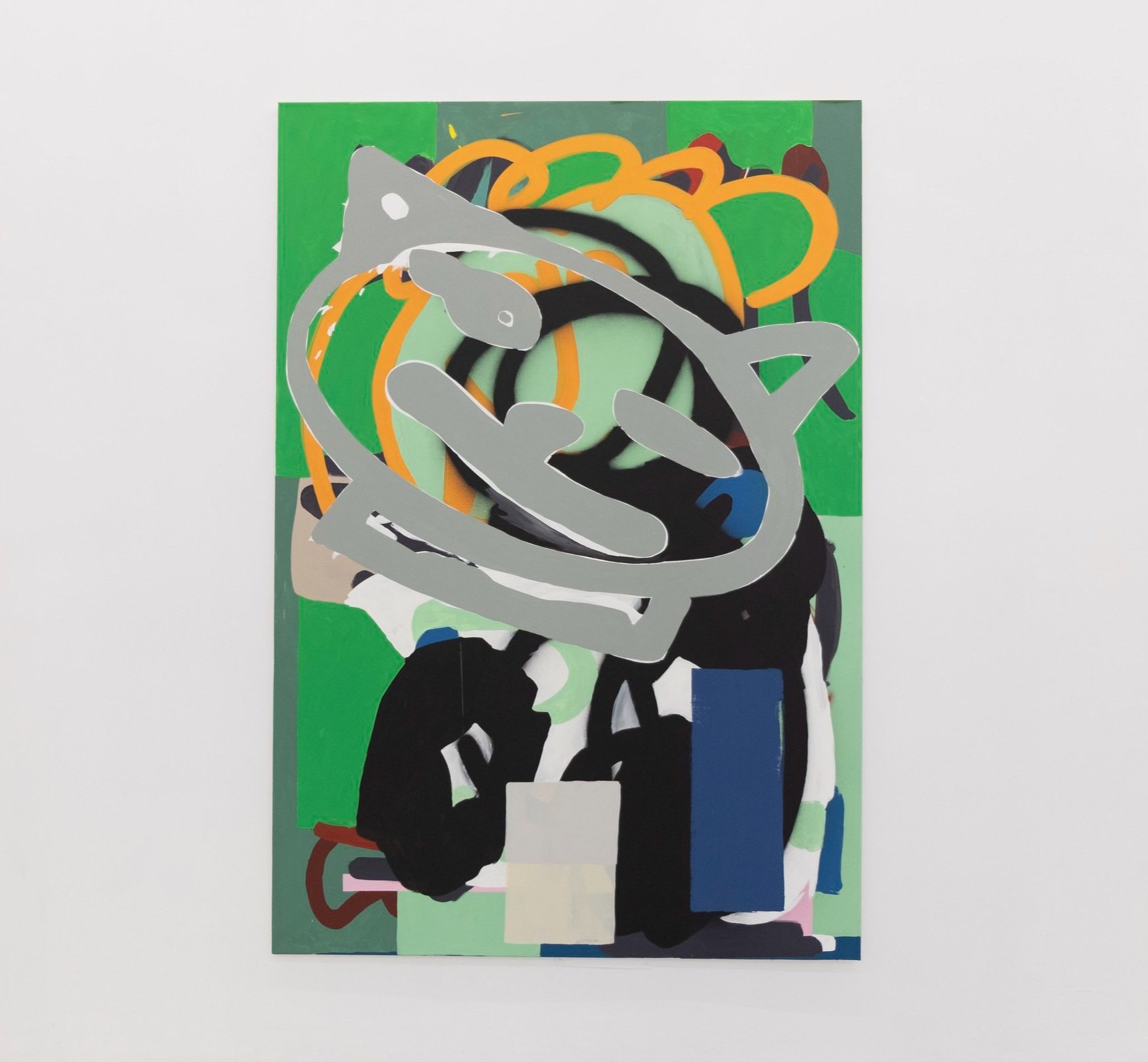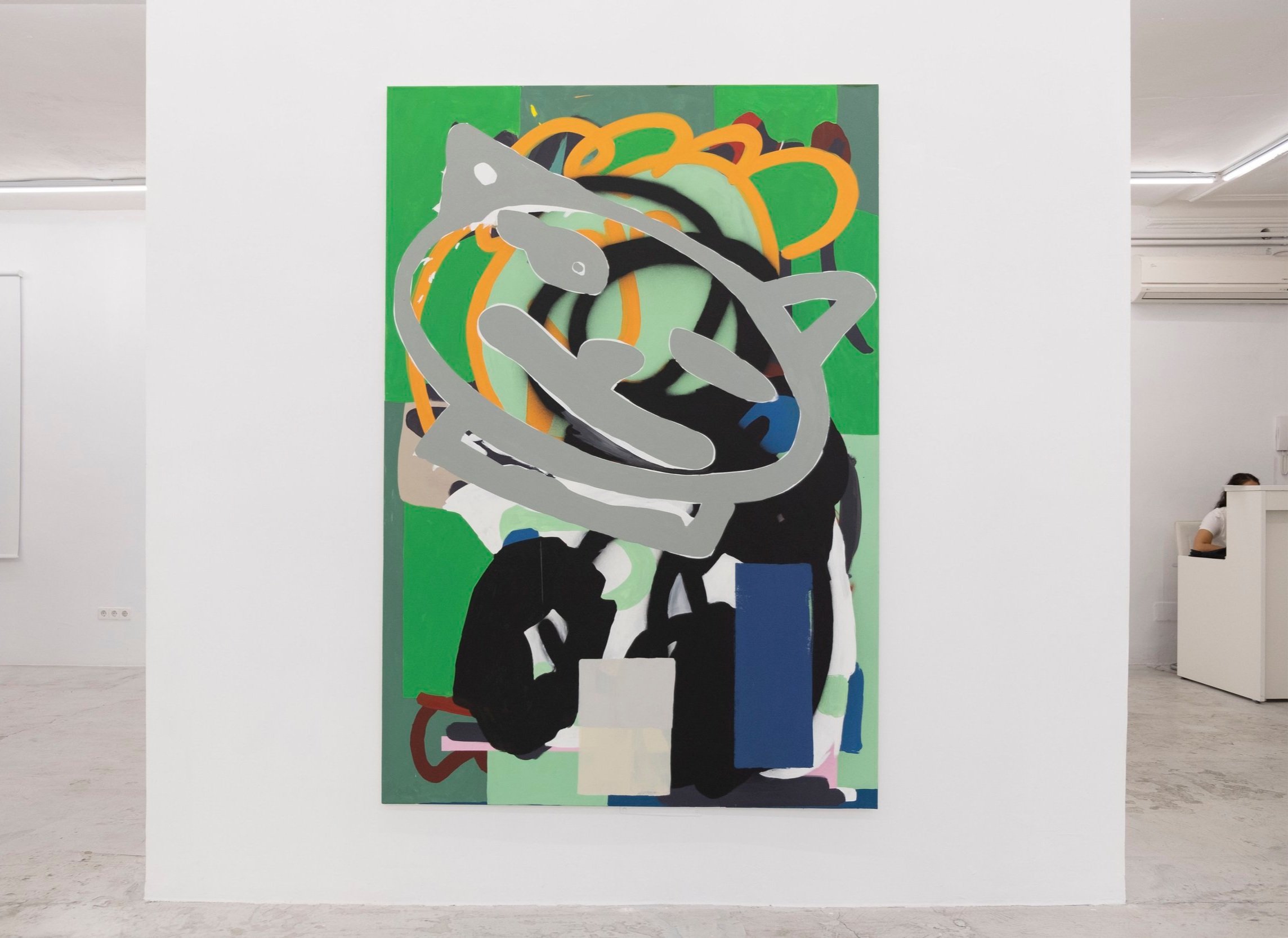Romain Blanck

“Every painting ends ups as a summary of a lot of actions that were done by strangers and then by me, combining all these elements inside a rectangle”
Interview by Charlie Hawksfield
Could you tell us a bit about yourself and your background? Where did you study?
I graduated from the Ecole Nationale Supérieure des Beaux Arts (ENSBA) de Lyon in France three years ago, and have been living and working in Berlin since two years. I have moved a lot between Germany and France growing up and now realise that I continue to do so.
I was interested in what you said about your paintings, that you are interested in marks and doodles that “…we don’t necessarily notice right away, often realised in a certain urgency and quickly abandoned” Do you think there is a time delay with some kinds of graphic marks? How do you engage with the immediacy and the tendency to overlook this sort of mark-making?
Most of these marks and scribbles are done by strangers in art-supply shops on pieces of papers where you can try out the different pens. There certainly is a big relation to time since the original papers are often the result of only one or two days before being replaced by a blank one. Also when you try out a pencil on a Saturday in a crowded shop, you may feel the rush from everybody being next to you, and so, trying it on a Monday morning is different. You enter a state of mind where for a couple of seconds you escape everything to repeat some mechanical movements, even if you draw a face, and the feeling of urgency is visible on each paper. When collecting them it feels like waiting the end of the market and hope for leftovers. There is a film about this called "Les glaneurs et la glaneuse" by Agnes Varda. When in my studio, the time then expands and the chosen lines will be duplicated with less rush, due to the change of environment, scale, and tools.
The small works you have been making this year such as Ansichtsexemplar : Paynesgrau (2022) seem like a bit of a departure from your other pieces, they are a different scale, monochromatic and seem more compact and sculptural than the earlier paintings. Could you talk about your process and thinking in making these works? Do you see them as a new direction or just a continuation of your process?
An Ansichtsexemplar (viewing sample) is the one product, a notebook, a pen, or a car, that you can test as a client in a shop. Most of the time you can see the passage of previous persons before you, as this object will have using marks or scratches. Some of them are real wooden or linoleum boards that I took from different shops where you could try out the knives and engraving tools, and some of them are completely made up. So it is very similar to the scribbles on notepads that I use as my vocabulary to paint. The repeated layers of transparent shiny or matt lack underline the scratches and bring the boards to exist as completely new objects. The repetition of the same size, or colour, and of the same type of marks throughout the series underline the mechanical process of trying a tool. I think they can work along the other paintings since their scale is determined by these shops and will probably only exist this little, while the paintings often are very big to enlarge a maximum the pencil marks that I find.
Ansichtsexemplar Neutralgrau 3, 2022
Ansichtsexemplar Paynesgrau 1, 2022
Oh!Hey!Hi!Hello!, We Collect, 2021
Biennale Mulhouse 021, 2021
Oh!Hey!Hi!Hello!, We Collect, 2021
In one of your recent shows you used stickers as another layer of information in the works. What lead you to this decision and is it something you want to take further in your work?
The stickers are coming from social media applications and are directly layered over the paintings using my phone to do so, before being copied on the canvas. Implementing a sticker on top of a picture or a conversation is also something mechanical we all do on our phones. Nowadays you will experience more images of paintings on the internet, on social media, art blogs, than in person. We all experience way more images of art through their reproduction shared on the internet. I wanted to use the tool of sharing these images to attack my originals, and the paintings seem to only become backgrounds for these stickers to overlay them. I think they are quite cynical even if they appear very joyful, fun, and stupid, because by having them outside your phone and covering parts of the painting they look out of place. But in the end, they become part of the painting, have the same treatment and exist on the same level as any other line done.
Your work translates a lot of automatic marks made by others, such as on scribble pads, into often large scale works using “clumsy” implements. Daniele Capra described this process as “a sort of free-word poetry belonging to a primary visual vocabulary” I think this is a very succinct way of putting it. Do you agree with the description of your work as “free word poetry?” in this sense?
I try to approach the paintings like you could approach elements of language, repeating some lines, and translating others ones. The try-on notepads are fascinating to me for being completely free: you could try out fifty pens and buy none of them, and at the same time you can do whatever you want because the paper will likely disappear anyways. I feel free to use these elements as I consider all the scribbles that I find and duplicate on my paintings as available elements since they are abandoned in these places. It’s like finding music free of rights uploaded by an unknown person and sampling it into something new. I feel that the paintings are free because none of the shapes are mine and I just compose them picking up what caught my eye. Every painting ends ups as a summary of a lot of actions that were done by strangers and then by me, combining all these elements inside a rectangle.
Do not enter with metallic balloons, AAAA Nordhavn, Copenhaguen, 2022
10.07.22 (hilf mir), 2022
31.06.22 (here there nowhere), 2022
What artwork have you seen recently that has resonated with you?
One work in particular seems difficult, but I got to see some works of Anne Imhof in the Boros Collection in Berlin recently, and the last exhibition I went to was the Biennale in Lyon to see the works of my friend Pierre Unal-Brunet at the Contemporary Art Institute IAC Villeurbanne.
All images are courtesy of the artist
Date of publication: 03/11/22







